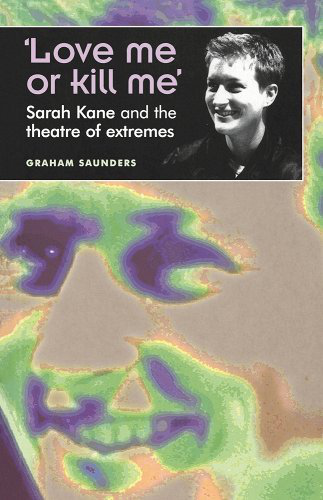4 minutes
‘Love me or kill me’
I’ve only ever written to escape from hell — and it’s never worked — but at the other end of it when you sit there and watch something and think that’s the most perfect expression of the hell that I felt then maybe it was worth it.
– Sarah Kane

‘Love me or kill me’ by Graham Saunders @ Bookshop
Quotes
It’s always been the form I loved most because it’s live. There’s always going to be a relationship between the material and the audience that you don’t really get with a film. I mean with the film wrote, Skin, people can walk out or change channels or whatever, it doesn’t make any difference to the performance. But with Blasted, when people got up and walked out it was actually part of the whole experience of it. And I like that, it’s a completely reciprocal relationship between the play and the audience.
I do not feel a responsibility towards the audience or to other women. What I always do when I write is to think: how does the play affect myself? If you are very specific in what you try to achieve, and it affects yourself, then it may affect other people too. On the other hand, if you have a target group in mind, and you think, ‘I want to affect the eleven million people watching ITV on Sunday, then everything becomes bland So for me I am quite happy to aim at the smallest audience possible, which is myself, because I am the only person who is definitely going to see this play anyway. That’s why I try to please myself.
If we can experience something through art, then we might be able to our future, because experience engraves lessons on our hearts through suffering, whereas speculation leaves us untouched… It’s crucial to chronicle and commit to memory events never experienced - in order to avoid them happening. I’d rather risk overdose in the theatre than in life.
If a play is good, it breathes its own air and has a voice of its own. What you take that voice to be saying is no concern of mine. It is what it is. Take it or leave it.
Art isn’t about the shock of something new. It’s about arranging the old in such a way that you see it afresh. The press kept asking why it was necessary to show such acts of violence on stage. I think it was necessary because we normally see war atrocities as documentary or news footage. And Blasted is no documentary. So suddenly all those familiar images were presented in an odd theatrical form which provided no framework within which to locate oneself in relationship to the material. For me, that’s an amoral representation of violence - no commentary.
It’s probably a life-saving humour. When I was first thinking about writing that play I read an article in a newspaper written by a man who’d been suffering from clinical depression for three years. And he said the only thing that he’d had to hang onto was this really morbid sense of humour. It was the only thing that made him bearable to be with. And that kept him rooted. I suppose that was the thing with Phaedra’s Love. I think when you are depressed oddly your sense of humour is the last thing to go; when that goes then you completely lose it. And actually Hippolytus never ever loses it.
Cleansed is also the most neo-Jacobean of Kane’s plays, whereby every word, action and gesture are uncompromising and in extremis … Cleansed is a nightmare of a play, it unreels somewhere between the back of your eyes and the centre of your brain with an unpredictable but remorse less logic. As with a nightmare, you cannot shut it out because nightmares are experienced with your whole body.
When you love obsessively, you do lose yourself. And when you then lose the object of your love, you have none of the normal resources to fall back on. It can completely destroy you.
There’s that line in the monologue from 4.48 Psychosis where he or she says-‘I cannot believe that I have all this love for you, and you feel nothing (214). So she has all of this love, and all of these feelings, and they’re not reciprocated. I also think its important to say that I think it’s unconditional love, especially with Rod and Carl. Rod starts off saying, ‘I love you now, (111) and of course at the end of the play he’s transformed.